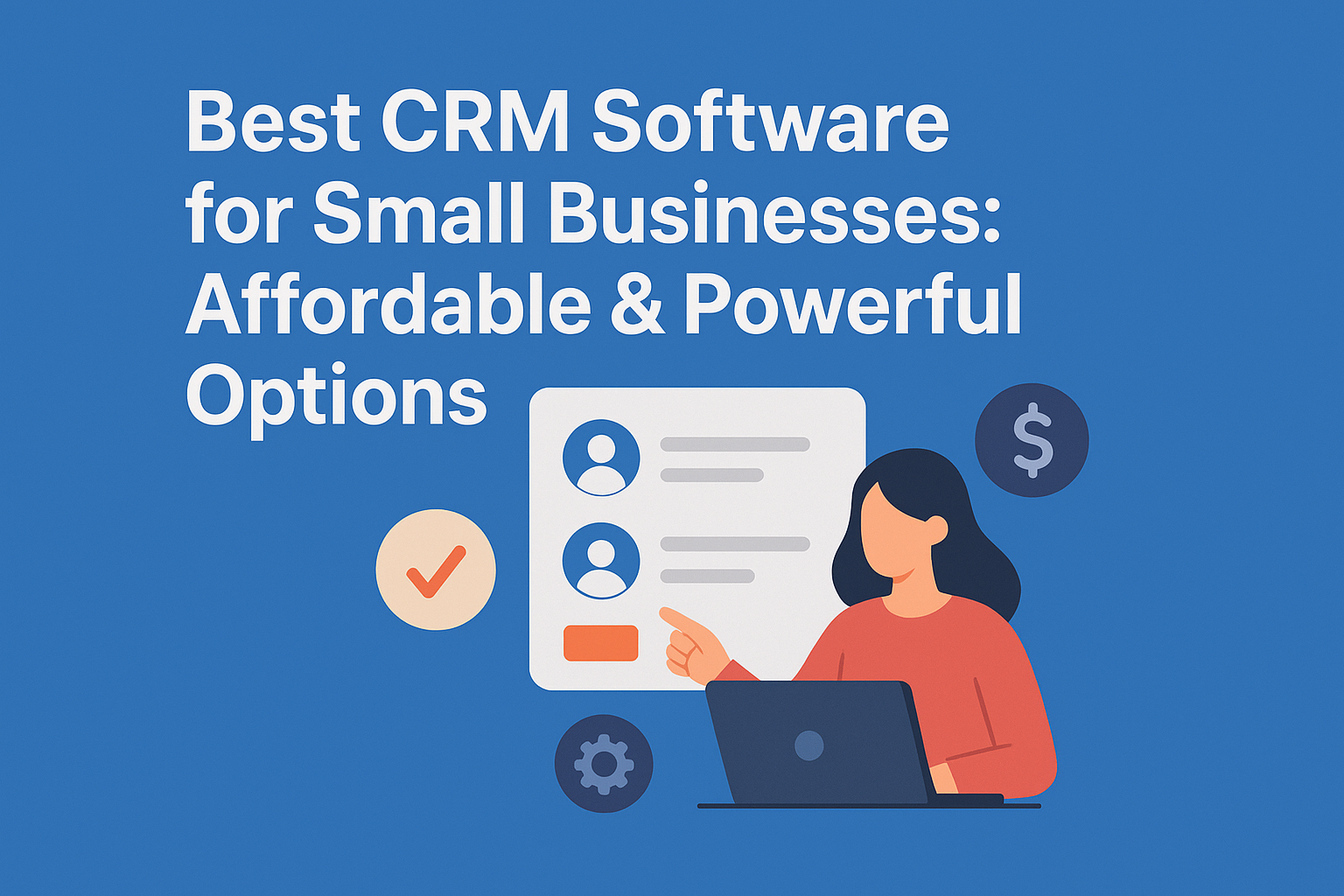Introduction
Customer relationships are the heart of every successful business. For small businesses, building and maintaining strong connections with customers can decide long-term growth. That’s where CRM (Customer Relationship Management) software comes in.
CRM software helps small businesses manage leads, track sales, store customer data, and improve customer service. In 2025, affordable yet powerful CRM tools are available that fit the needs of startups, bloggers, and small teams.
Just as you invest in affiliate marketing with hosting or SEO for beginners to grow online, choosing the right CRM can transform how you connect with your customers.
Why Small Businesses Need CRM Software
- Centralized Customer Data – Store all customer details in one place.
- Better Sales Tracking – Monitor deals, revenue, and follow-ups.
- Improved Communication – Teams can collaborate on customer interactions.
- Automation – Save time on repetitive tasks like emails and reminders.
- Growth Enablement – Pairs well with how to earn money from blogging in 2025 by helping track leads from content and campaigns.
Top CRM Software for Small Businesses in 2025
1. HubSpot CRM – Best Free CRM
Features:
- Contact and deal management
- Email tracking and templates
- Marketing & sales dashboards
- Free forever plan
Pros:
- Free version is powerful
- Easy to set up
- Integrates with hundreds of apps
Cons:
- Advanced features are expensive
- Can feel limited for scaling businesses
Pricing: Free; Paid plans start at $18/month.
2. Zoho CRM – Best Budget Option
Features:
- Sales automation
- Lead scoring
- AI-powered analytics
- Omnichannel communication (email, phone, chat)
Pros:
- Very affordable
- Strong customization
- Works well with other Zoho tools
Cons:
- Interface is a bit outdated
- Can be complex for beginners
Pricing: Starts at $14/user/month.
3. Salesforce Essentials – Best for Growing Teams
Features:
- Contact and account management
- Opportunity tracking
- Reports and dashboards
- App integrations via AppExchange
Pros:
- Scalable CRM solution
- Advanced features for small teams
- Strong automation
Cons:
- Expensive compared to others
- Learning curve
Pricing: $25/user/month.
4. Freshsales (by Freshworks) – Best for Ease of Use
Features:
- Built-in phone & email
- Lead scoring
- AI-based insights
- Workflow automation
Pros:
- User-friendly interface
- Affordable pricing
- Good for sales-focused teams
Cons:
- Limited customization
- Advanced analytics missing
Pricing: Free plan; Paid starts at $15/user/month.
5. Pipedrive – Best for Sales Pipeline Management
Features:
- Visual sales pipeline
- Email sync & tracking
- Activity reminders
- Sales reports
Pros:
- Very simple to use
- Great for small sales teams
- Focused on pipeline clarity
Cons:
- Limited marketing features
- Add-ons can be costly
Pricing: Starts at $12.50/user/month.
6. Insightly – Best for Project + CRM
Features:
- CRM + project management
- Workflow automation
- Email marketing
- Reporting tools
Pros:
- Combines CRM and project tools
- Affordable
- Good for service-based businesses
Cons:
- Not as advanced as Salesforce
- Interface takes time to learn
Pricing: Starts at $29/user/month.
7. Bitrix24 – Best for All-in-One Collaboration
Features:
- CRM + task management
- Built-in telephony
- Social intranet
- Marketing automation
Pros:
- Free plan with many features
- Combines CRM with collaboration tools
- Great for startups
Cons:
- Overloaded with features
- Can feel slow at times
Pricing: Free; Paid starts at $15/user/month.
8. Capsule CRM – Best for Simplicity
Features:
- Contact management
- Sales pipeline
- Task reminders
- Integration with Google Workspace & Microsoft 365
Pros:
- Very simple interface
- Affordable for very small businesses
- Easy integrations
Cons:
- Lacks advanced automation
- Limited reporting
Pricing: Free for 2 users; Paid starts at $18/user/month.
9. Agile CRM – Best for Marketing + Sales
Features:
- Contact management
- Email campaigns
- Web engagement
- Helpdesk features
Pros:
- Combines marketing + CRM
- Great for small online businesses
- Free for up to 10 users
Cons:
- Interface looks dated
- Limited support
Pricing: Free (10 users); Paid starts at $8.99/user/month.
10. Nutshell – Best for Email Marketing Integration
Features:
- Sales automation
- Email sequencing
- Reporting dashboards
- Integrations with Mailchimp, Google Workspace
Pros:
- Strong email marketing support
- Easy to use
- Good for small sales teams
Cons:
- Smaller ecosystem
- Limited customization
Pricing: Starts at $16/user/month.
CRM + Blogging/Business Growth
CRM tools don’t just manage customer data—they help you grow online businesses.
- Combine CRM with AI tools for content creators to nurture leads from blog content.
- Pair CRM with WordPress hosting to track subscribers and customers.
- Use CRM insights to strengthen campaigns while applying SEO for beginners techniques.
Comparison Table of CRM Tools
| CRM | Best For | Starting Price | Free Plan |
|---|---|---|---|
| HubSpot CRM | Best Free CRM | $0 | ✅ |
| Zoho CRM | Budget Option | $14/user/mo | ❌ |
| Salesforce Essentials | Growing Teams | $25/user/mo | ❌ |
| Freshsales | Ease of Use | $15/user/mo | ✅ |
| Pipedrive | Sales Pipeline | $12.50/user/mo | ❌ |
| Insightly | CRM + Projects | $29/user/mo | ❌ |
| Bitrix24 | All-in-One | $15/user/mo | ✅ |
| Capsule CRM | Simplicity | $18/user/mo | ✅ (2 users) |
| Agile CRM | Sales + Marketing | $8.99/user/mo | ✅ (10 users) |
| Nutshell | Email Marketing | $16/user/mo | ❌ |
Conclusion
For small businesses, the right CRM can transform operations:
- HubSpot CRM – Best free option to start.
- Zoho CRM – Best affordable choice.
- Salesforce Essentials – Great for teams planning to scale.
- Freshsales & Pipedrive – Perfect for sales-focused startups.
Pairing CRM tools with how to earn money from blogging in 2025, affiliate marketing, and strong SEO ensures not only customer management but also long-term business growth.
